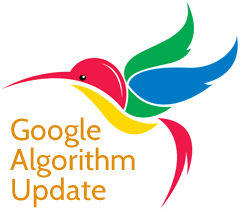 No Google haven’t started to breed hummingbirds, we’re talking about the name given to their recent update to their search engine algorithm. And although the Hummingbird is among the smallest of birds it has most certainly created a huge amount of discussion and debate within SEO and tech communities. So much so, that since the update happened around the end of September it even got featured in a Telegraph newspaper article.
No Google haven’t started to breed hummingbirds, we’re talking about the name given to their recent update to their search engine algorithm. And although the Hummingbird is among the smallest of birds it has most certainly created a huge amount of discussion and debate within SEO and tech communities. So much so, that since the update happened around the end of September it even got featured in a Telegraph newspaper article.
So what’s all the fuss about and how big an impact is Hummingbird likely to have on SEO strategy?
What exactly is Hummingbird?
Essentially, Hummingbird consists of a new technology called the Knowledge Graph. In a nutshell the Knowledge Graph is Google’s attempt at a creating a more intelligent search engine and one that tries to get inside the mind of someone carrying out a search to better understand what type of information they’re really after. Because of the huge volumes of digital content that now exist on the web, Google’s users are having to be more specific in the way they search and to do this they’re having to type longer phrases into Google and in some cases they’re often having to completely rephrase their query if Google was way off the mark first time round. And all this is frustrating and time consuming for Google’s users which isn’t great for the brand, which now has shareholders to keep happy!
So what Google is now capable of doing, similar to a human mind is make connections between items and answer complex questions. It does this through its semantic search capabilities, to the layman that means Google is analysing all words used in a search query to better understand the true meaning of the phrase we have typed in. This is a subtle move away from just simply providing a set of search results and web pages to delivering meaningful answers. For example Hummingbird will more greatly consider question words like “how” “why”, “where” and “when” in search phrases.
Another thing built into the Hummingbird update is conversational search or ‘hot wording’ as Google calls it.
I tried it out myself and asked Google “Where is my nearest GP” and to my amazement Google served the ‘Find Services’ page on the NHS website at the top of its search results. Exactly the type of page I’d need if I was indeed looking for my nearest doctors surgery. So it does look like Google is able to intelligently connect up the words and provide users with highly relevant content. Eventually, this technology might reach the point of understanding text on a more nuanced and human level, a scary and yet thrilling thought.
How does this impact SEO?
However, Google’s saying there’s nothing new or different SEOs or publishers need to worry about. Its best practice guidance remains the same: create original, high-quality content, but I do believe healthcare marketers now need to think beyond simple therapy/disease or product and service based keywords and think about the types of sentences they’ll be typing in. To do this well you really do need to understand your target audiences’ information needs and the different stages they go through as part of their decision making or purchasing process.
Marketers need to better understand the types of problems certain groups of patients and HCPs are looking to solve when they go online and the common types of questions they seek credible answers to. Once they’ve done this they then need to think about the actual content itself and make sure their digital content is relevant to those search queries being ‘Googled’. It’s also important to try and determine what format is most likely to appeal to and engage those audiences when they first come into contact with that content, i.e. static web pages, videos, infographics, images or a combination of them all, as this will help to reduce bounce rates which will also help secure high rankings.
One beneficial result of Hummingbird should be that it creates a more level playing field for smaller healthcare organisations that specialise in a particular aspect of healthcare or focus on a specific therapy/disease area. The high volume, generic paid search keywords are often dominated by large multi-national organisations that have a diverse brand portfolio and deep pockets that enable them to win the Google Adwords bidding war. But because of the more generic nature of their web content, this means that they are at a disadvantage when it comes to the less predictable nature of semantic search results. The Hummingbird update should enable smaller niche companies that have the ability to produce unique, informative and fresh content specifically relating to that niche, gain a higher ranking in the search results when a precise and complex search phrase is used.
However, one negative linked to Hummingbird is that as Google accelerates its movement away from Google keyword search to Google semantic search, Google will encrypt all future search results, which means that they’ll no longer provide any data whatsoever within web analytics packages on organic keyword referrals. For us marketers this means that we are going to be completely in the dark when it comes to knowing which keywords are sending people to our website and more importantly driving and assisting conversions from the organic search results. There’s more on this topic in my other post titled: “Google Analytics no longer providing organic keyword data“.
Need help?
If your organisation has been hit by Hummingbird and need expert help to better understand what changes you should be making to your healthcare SEO strategy to get your site performing well in the organic search results then get in touch to request a Google Hummingbird Impact Assessment.


